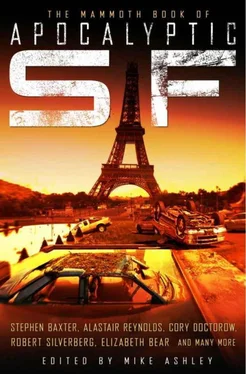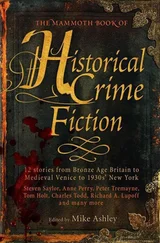Everyone was having fun — everyone but Ruul. When his mother was too busy to notice, he crept away into the dark.
Some time ago, restlessly exploring the edge of the inhabited cave, where tunnels and boreholes stretched on into the dark, he had found a chimney, a crack in the limestone. It looked as if you could climb up quite a way. And when he shielded his eyes, it looked to him as if there was light up there, light of a strange ruddy hue. There might be another group somewhere in the caverns above, he thought. Or it might be something stranger yet, something beyond his imagination.
Now, in the dim light of the torches, he explored the chimney wall. Lodging his fingers and toes in crevices, began to climb.
He was escaping the party. Eleven years old, neither child nor adult, he just didn’t fit, and he petulantly wished the festival would go away. But as he ascended into profound silence the climb itself consumed all his attention, and the why of it faded from his mind.
His people, cavern-bound for uncounted generations, were good at rock-climbing. They lived in caverns in deep limestone karsts, laid down in long-vanished shallow seas. Once these hollows had hosted ecosystems full of the much-evolved descendants of lizards, snakes, scorpions, cockroaches, even sharks and crocodiles. The extreme and unchanging conditions of Pangaea had encouraged intricacy and interdependency. The people, retreating underground, had allowed fragments of these extraordinary biotas to survive.
Soon Ruul climbed up out of the limestone into a softer sandstone, poorly cemented. It was easier to find crevices here. The crimson light from above was bright enough to show him details of the rock through which he was passing. There was layer upon layer of it, he saw, and it had a repetitive pattern, streaks of darkness punctuated by lumpy nodules. When he touched one of the nodules, he found a blade surface so sharp he might have cut his fingers. It was a stone axe — made, used, and dropped long ago, and buried somehow in the sediments that had made this sandstone. Growing more curious he explored the dark traces. They crumbled when he dug into them with a fingernail, and he could smell ash, as fresh as if a fire had just burned here. The dark layers were hearths.
He was climbing through strata of hearths and stone tools, thousands of layers all heaped up on top of one another and squashed down into the rock. People must have lived in this place a very long time. He was oppressed by a huge weight of time, and of changelessness.
But he was distracted by a set of teeth he found, small, triangular, razor-edged. They had holes drilled in them. He carefully prised these out of the rock and put them in a pouch; perhaps he would make a necklace of them later.
With aching fingertips and toes, he continued his climb.
Unexpectedly, he reached the top of the chimney. It opened out into a wider space, a cave perhaps, filled with that ruddy light. He hoisted himself up the last short way, swung his legs out onto the floor above, and stood up.
And he was stunned.
He was standing on flat ground, a plain that seemed to go on forever. It was covered in dust, very red, so fine it stuck to the sweat on his legs. He turned slowly around. If this was the floor of a cave — well, it was a cave with no walls. And the roof above must be far away too, so far he could not see it; above him was nothing but a dome of darkness. He had no word for sky. And in one direction, facing him, something lifted over the edge of the world. It was a ruddy disc, perfectly circular, just a slice of it protruding over the dead-flat horizon. It was the source of the crimson light, and he could feel its searing heat.
Ruul inhabited a convoluted world of caverns and chimneys; he had never seen anything like the purity of this utterly flat plain, the perfectly circular arc of that bow of light. The clean geometric simplicity of the landscape drew his soul; he stared, entranced.
Three hundred million years after the life and death of Tura and Bel, this was what Earth had become. The sediments on which Ruul stood were the ruins of the last mountains. The magmatic currents of a cooling world had not been able to break up the new supercontinent, as they had the first. Meanwhile the sun’s relentless warming continued. By now only microbes inhabited the equatorial regions, while at the poles a few hardy, tough-skinned plants were browsed by sluggish animals heavily armoured against the heat. Earth was already losing its water, and Pangaea’s shoreline was rimmed by brilliant-white salt flats.
But the boy standing on the eroded-flat ground was barely changed from his unimaginably remote ancestors, from Tura and Cale and Urlu and even Jaal. It had never been necessary for humans to evolve significantly, for they always adjusted their environment so they didn’t have to — and in the process stifled evolutionary innovation.
It was like this everywhere. After the emergence of intelligence, the story of any biosphere tended to get a lot simpler. It was a major reason for the silence of the stars.
But on Earth a long story was ending. In not many generations from now, Ruul’s descendants would succumb; quietly baked in their desiccating caves, they would not suffer. Life would go on, as archaic thermophi-lie microbes spread their gaudy colours across the land. But man would be gone, leaving sandstone strata nearly a billion years deep full of hearths and chipped stones and human bones.
“Ruul! Ruul! Oh, there you are!” His mother, caked by red dust, was clambering stiffly out of the chimney. “Somebody said you came this way. I’ve been frantic. Oh, Ruul — what are you doing?”
Ruul spread his hands, unable to explain. He didn’t want to hurt his mother, but he was excited by his discoveries. “Look what I found, mother!”
“What?”
He babbled excitedly about hearths and tools and bones. “Maybe people lived here in great heaps, and the smoke of their fires rose up to the sky. Mother, will we come to live here again?”
“Perhaps one day,” his mother said at random, to hush him.
But that wasn’t answer enough for Ruul. Restless, curious, he glanced around once more at the plain, the rising sun. To him, this terminal Earth was a place of wonder. He longed to explore. “Let me go on. Just a little further!”
“No,” his mother said gently. “The adventure’s over. It’s time to go. Come now.” And she put her arm around his shoulders, and led him home.
THE STAR CALLED WORMWOOD
Elizabeth Counihan
I could have concluded this anthology with any of several stories, but there is something about the ending of this story that seemed just right, and brings our journey through an apocalyptic future almost full circle.
Elizabeth Counihan is from a writing family. Her father was a BBC journalist and her grandfather a novelist. Elizabeth was a family doctor in the National Health
Service for many years but is now concentrating on writing. Her stories have appeared in Asimov’s, Realms of Fantasy, Nature Futures and several other magazines and anthologies. She is the editor of the British fantasy magazine Scheherazade.
* * *
IN THE WEEK that Anya died a comet approached the Earth. At first a bright spark in the east, it enlarged, trailing a cloud of shimmering white — a glowing snowball, flung into the sky above the frozen landscape of Siberia. Anya did not see it. She lay, ninety-nine years old, in the last ice palace, tended by machines older than she was. Their antennae perceived the new celestial body. Their voices reported it, echoing through vaulted chambers and long-abandoned halls where, here and there, a small creature twitched a whisker or pricked a furry ear before returning to the business of living. The voices whispered in Anna’s room. She could no longer speak but electronic eyes interpreted the movement of her lips, and recorded that her last word was “Wormwood”. Her breath rattled in a last sigh and her eyes closed.
Читать дальше












